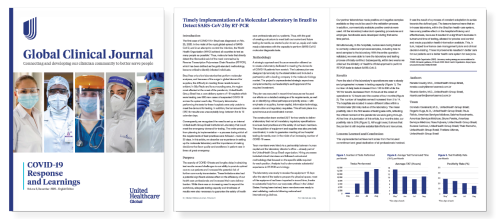Why did you feel it was important to share this perspective with other clinicians? Sharing is key in our line of work. It was difficult, especially in the beginning of the pandemic, not to give in to the feeling of solitude and uncertainty that overwhelmed us. It was important to know that we are not alone. Feeling supported gives us strength and grounds us to keep doing what needs to be done to treat our patients well. I find it extremely important to let everyone in our organization know that there is always someone to turn to for help – someone who will listen or just put you in contact with someone else who might be going through the same thing. There is strength in numbers.
As communication became key for navigating COVID-19, what measures did you take to ensure teams were on the same page during such a quickly evolving situation? I feel that this year we grew, learned and improved in our communication with each other. It was crucial to make sure we were updating protocols as soon as guidelines came out or changed. Additionally, we had to make sure the updates were available to everyone. Promoting regular meetings, involving all levels of the organization and optimizing communication with daily newsletters was key to make sure everyone was informed. Our “Knowledge Center” really expanded this year with online education material of all sorts, not just related to Covid-19. This includes digital and remote consultation in ambulatory care. There is still a lot of space for improvement and a lot of mistakes to correct, but that just goes to show that we are alive and kicking!
While projects and new goals being put on hold is certainly an unfortunate impact, what were some examples of the resiliency by teams that was gained during this time? I think that if there is one word that describes the team this year, it’s resilience! The generosity that people and teams showed during this time was massive. People volunteered to step out of their comfort zone and work all sorts of hours to help in providing care and helping out in any way necessary as others got ill or could no longer contribute anymore. The solidarity was, and is still, amazing.
You mention needing to ration certain supplies and even staff, which is a difficult reality of navigating this pandemic. How did you approach these tough decisions? In the beginning, especially, we were unprepared for the dimensions of this pandemic. PPEs were heavily rationed, something we were not at all used to and maybe even took for granted. Thankfully, this problem was quickly solved.
One of the great challenges is staff reorganization in such tough times. The shortage of staff, doctors and nurses alike makes it difficult to ensure 24/7 care of patients and people responsible for scheduling rosters had a particularly challenging year. However, we have yet to leave any blank space in the physician shift roster. We have managed to work out all problems using only dialogue and team spirit, a fact we are extremely proud of.
As COVID-19 cases continue to rise across the world, following an ongoing marathon of battling the pandemic, what new challenges are you facing, both today and in the months to come? I think one of the major worries at the moment is that clinical teams are becoming tired and are at risk for burn-out. We are now entering the peak “second wave,” and people have been so generous and given so much up till this moment that it is difficult to fathom that this rhythm is sustainable in the long term. I am now infected (from a patient, while working) and at home and even though I can still help out with some things from home, I know someone else is working overtime to fill in my place. This creates great anxiety. We know that when we are tired, we are prone to making mistakes and not being on top of our game. As leaders, we have to think of this and continue to motivate our teams to make sure that when people are resting, that they really, truly, rest. We have to continue to encourage them, give them feedback and celebrate all that is done.
In working alongside the rest of the UnitedHealthcare Global team, what were a few ways you were able to collaborate through planning or strategy that you believe aided your execution? I feel like we were given a lifeline, a break, to be able to concentrate on patient care. In this line of work you are so used to continuous problem solving, to thinking on your feet, and to bringing the answer to the discussion.. I cannot say this enough - it was truly surprising and comforting to be able to “depend” on our organization for help, not only in sharing protocols and data but also in supplying equipment that was needed and providing for anything else that was amiss. This support was remarkable. It allowed us to really concentrate on the work at hand, which was treating patients. In all these months we felt that all decisions were made in the best interest of the patients.
Dr. Ana Prado is the Chief Medical Information Officer at Lusíadas Saúde, UnitedHealthcare Global's health care delivery business in Portugal. Read her full article.
